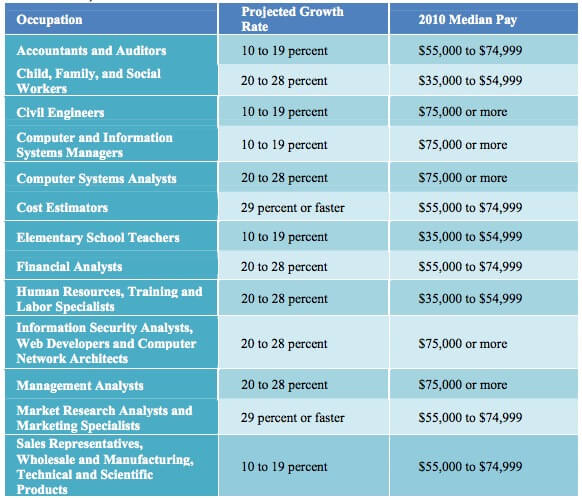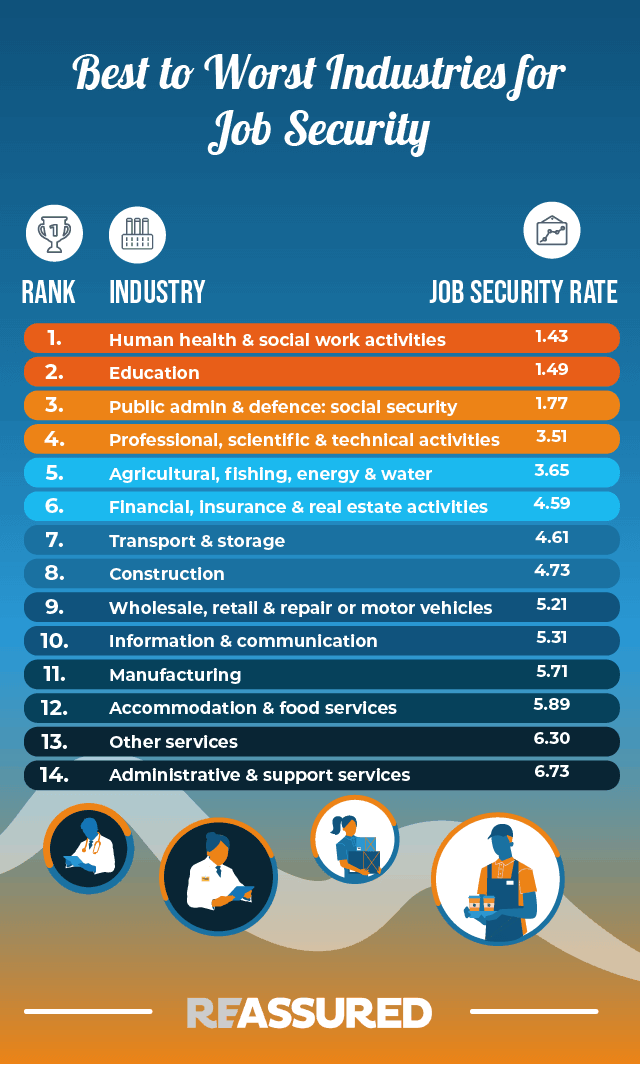Best Career Options For Recent Graduates
Have you ever wondered why certain graduates transition seamlessly into their careers when others struggle? The answer might surprise you – it’s often not what they studied but where they apply their skills. Recent surveys indicate that nearly 60% of graduates end up working in fields unrelated to their degree.
The best career options for today’s graduates often lie in technology, healthcare, and finance. These industries have shown significant growth over the years and continuously offer numerous opportunities. For instance, tech graduates have a 75% higher chance of employment within six months of graduation compared to other fields.

Best Career Options for Recent Graduates
As fresh graduates step into the job market, technology careers beckon with opportunities galore. Fields like software development and data analysis boast high demand. Many tech jobs offer flexibility, allowing work from home or beyond the traditional office. Additionally, these roles are often well-paid, making them attractive choices. A career in technology can promise growth and innovation.
Healthcare is another booming sector for graduates. Medical fields are always in need of professionals, ranging from nurses to lab technicians. These roles contribute significantly to society by improving and saving lives. While some health jobs require specialized training, others are more accessible. The job stability and fulfillment in healthcare can be very rewarding.
The finance industry offers numerous roles tailored to recent graduates’ skills. Accounting and financial consulting positions are popular within this sector. Graduates often find finance jobs both challenging and engaging. These roles typically come with the potential for substantial earnings and progression. Working in finance requires analytical skills and an eye for details.
Beyond specific industries, a variety of job types remain open to new graduates, offering diverse career paths. Internships and part-time jobs in any sector provide invaluable experience and networking opportunities. Employers value these experiences when hiring full-time staff. Various industries aim to hire young talent and mold them for future roles. A wide range of career options ensures exciting possibilities for every graduate, regardless of degree.
1. Career Options in Technology
Technology careers offer exciting and diverse opportunities for recent graduates. Software development is top of the list, involving creating and maintaining applications. Another promising role is data analysis, where professionals interpret data to guide business decisions. Cybersecurity is crucial, protecting sensitive information from threats. The variety ensures something for everyone.
Web development is another great tech career, focusing on building and maintaining websites. Front-end developers work on the visible parts of websites, while back-end developers handle databases and server-side logic. Combining both roles creates a full-stack developer, a highly sought-after position. Web development requires creativity and technical skills. It’s a field ever-evolving with new technologies.
Artificial intelligence (AI) and machine learning (ML) are revolutionizing many industries. Graduates in this area develop smart systems that can learn and make decisions. This field promises hefty compensation and the excitement of cutting-edge innovation. Knowledge in AI/ML is applicable in various sectors like healthcare, finance, and transportation. It’s truly a future-focused career path.
Graduates interested in hardware may find a fit in roles like network engineering or IT support. Network engineers ensure computer networks, both local and cloud-based, function smoothly. Meanwhile, IT support specialists assist with troubleshooting and maintaining hardware and software. Both these roles are vital to any organization’s operation. They offer stable and rewarding career paths.
2. Career Options in Healthcare
The healthcare industry offers varied career pathways for recent graduates. Nursing remains a cornerstone, with roles in hospitals, clinics, and community settings. Nurses provide essential care and support to patients, making a significant impact every day. Similarly, becoming a physician offers the chance to diagnose and treat illnesses. These careers are both noble and rewarding.
Options in allied health professions are plentiful, too. Physical therapists help patients improve mobility and manage pain. Medical technologists work behind the scenes in labs, conducting crucial tests. Each role requires specific training, but the skills are highly valued. They play pivotal roles in the healthcare system.
Administrative careers in healthcare are crucial for smooth operations. Healthcare administration involves managing clinics, hospitals, and other facilities. These roles ensure that healthcare services are delivered efficiently. Administrators often oversee budgets, staffing, and regulatory compliance. It’s a field suited for those strong in leadership and organization.
Public health is another exciting option for graduates. Professionals in public health work to improve community health and safety. They may design health policies, conduct research, or promote wellness programs. Graduates can make positive, widespread impacts in this field. Public health careers are varied, covering everything from disease prevention to health education.
3. Career Opportunities in Finance
Finance presents a myriad of career prospects for graduates. One of the most sought-after roles is that of a financial analyst. These professionals assess financial data to help businesses make informed decisions. Analysts often work in banks, insurance companies, and investment firms. Their insights are crucial for a company’s financial success.
Accountancy offers a stable and rewarding career path. Accountants manage financial records, ensure compliance with laws, and prepare tax documents. They are needed in every sector, from small businesses to large corporations. This role requires strong attention to detail and an analytical mind. Certified accountants often have increased job prospects and earning potential.
Another exciting finance career is in banking. Banking jobs can range from customer service roles to investment banking positions. Investment bankers help companies raise capital and provide strategic advice. Working in banking can be dynamic and challenging. It’s perfect for those who thrive in fast-paced environments.
Financial planning is yet another promising avenue in the finance industry. Financial planners assist individuals in managing their personal finances. They guide clients on savings, investments, and retirement planning. This role requires excellent communication skills and trustworthiness. Helping others achieve their financial goals is deeply rewarding.
Risk management is critical in safeguarding an organization’s assets. Risk managers analyze potential risks and develop strategies to minimize them. This role spans industries such as insurance and corporate sectors. Graduates in risk management help prevent financial losses and ensure stability. It’s a career that combines analytical skills with strategic thinking.
A career in finance can offer growth and development. Many graduates find satisfaction in roles that challenge their skills and push them to excel. Finance roles often include opportunities for advancement into leadership positions. Skills gained in the finance sector are applicable across various industries. It’s a field rich in opportunities and rewards.
The Type of Degree Matters: Specific Degrees and Their Job Prospects
Different degrees can open doors to various job prospects. A degree in computer science, for example, can lead to roles in software development, cybersecurity, or data analysis. With technology continuing to evolve, these fields are in high demand. There’s no shortage of opportunities for computer science graduates. The skills learned are applicable in both private and public sectors.
On the other hand, degrees in healthcare offer a path toward fulfilling careers. Nursing, for instance, is a degree that can lead to many specialties and high employment rates. Nurses are essential in hospitals, nursing homes, and clinics. Degrees in healthcare management are also becoming popular. They prepare graduates for supervisory roles within healthcare facilities.
A degree in business administration opens a variety of career paths. It can lead to opportunities in marketing, finance, or human resources. Business degrees are versatile and can be combined with other studies for specialized careers. Graduates with this degree often find roles as managers or consultants. The versatility of these degrees is a major asset.
Engineering degrees remain a highly lucrative choice. Engineers are needed in industries such as construction, technology, and energy. Graduates can choose between civil, mechanical, electrical, and other engineering fields. Each of these disciplines offers a solid career foundation. The analytical skills gained are crucial for tackling real-world challenges.
Those with degrees in education have opportunities in teaching and administration. Teachers are vital to shaping future generations. They work in elementary, middle, and high schools, as well as colleges. A degree in education can also lead to roles in curriculum development. These degrees hold significant societal value.
How Relevant are Internships and Part-Time Jobs to Building a Career?
Internships play a huge role in career development for many students. They provide real-world experience that textbooks simply can’t offer. Internships allow students to apply what they’ve learned in school to actual job situations. This experience is invaluable when entering the job market. Employers often seek candidates with practical experience.
Part-time jobs also offer significant career benefits. They teach essential skills such as time management, responsibility, and teamwork. Working part-time helps students earn money while gaining relevant work experience. It can also lead directly to full-time employment after graduation. Many employers value the initiative and dedication shown by part-time work.
The skills gained through internships and part-time jobs are often transferable. For example, problem-solving, communication, and organization are assets in any career. This experience can make a resume stand out in a competitive job market. Seeing work history on a resume reassures employers about a candidate’s capabilities. It shows they have practical experience to back up their education.
Networking is another key advantage of internships and part-time jobs. These roles often allow students to meet people within their chosen industry. Building professional relationships early can lead to job opportunities in the future. A good reference or a contact in the field can be crucial. This network can help guide career paths and open doors.
While not all internships are paid, the experience can be priceless. Internships often provide insights into a company’s culture and expectations. They give students a chance to explore different career paths. Even unpaid positions can offer valuable skills and connections. The knowledge gained can be a stepping stone to a successful career.
Employers tend to prefer candidates who have some form of work experience. Internships and part-time jobs often bridge the gap from education to employment. These work experiences build confidence and practical skills. They prepare students for the realities of the workplace. In the long run, they significantly contribute to career success.
Final Thoughts on Starting a Career as a Recent Graduate
Choosing the right career path involves understanding personal interests and the value of specific degrees. While high-demand fields like technology and healthcare offer numerous opportunities, other industries also provide rewarding careers. Taking advantage of internships and part-time jobs can lay a strong foundation for future success. They not only offer practical experience but also help in building a professional network.
A balanced approach, combining education with real-world experience, is essential. As graduates navigate the job market, focusing on growth areas and leveraging their skills will be key. The journey may start differently for each individual, but informed choices can lead to fulfilling career paths. Each step offers valuable lessons that contribute to long-term success.

